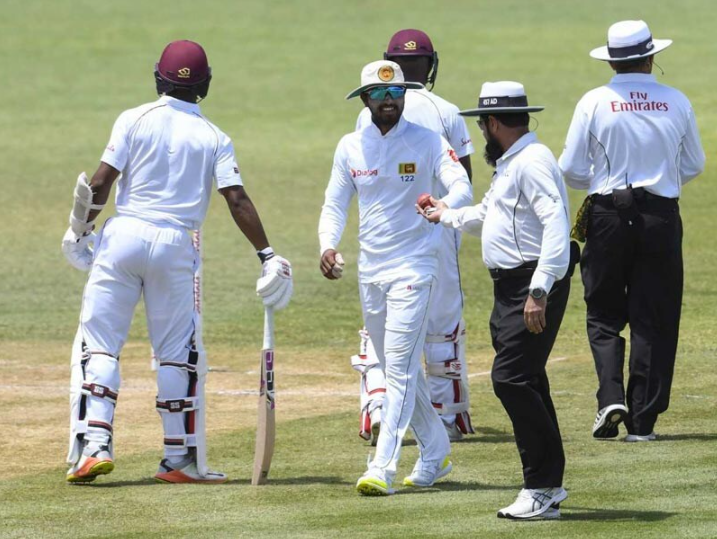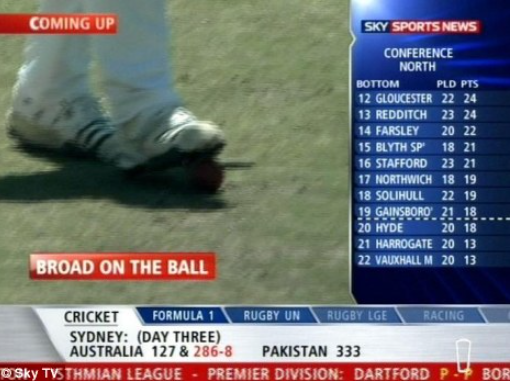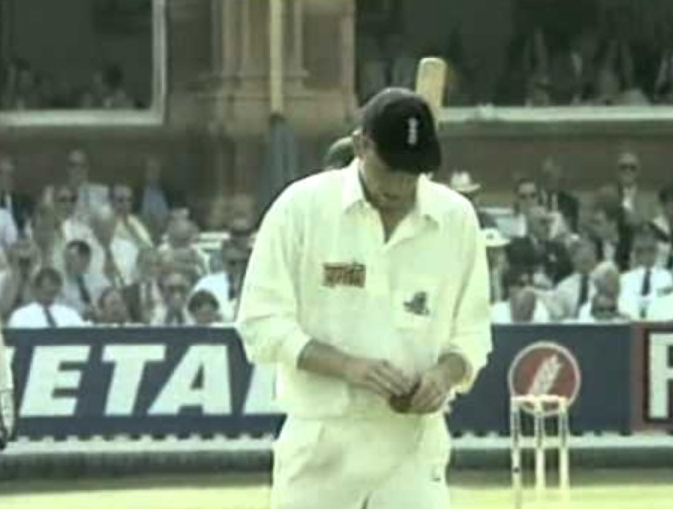What is Ball Tampering Scandal: Ball Tampering is referred to as an activity in cricket where the fielder illegally alters the condition of the cricket ball while fielding/bowling.
What is Ball Tampering Scandal?
The primary aim of ball tampering is to interfere with the aerodynamics of the ball to aid swing bowling.
What is the Purpose of Ball Tampering?
Generally, the purpose of altering the state of the ball is to achieve more favourable bowling conditions.
Examples of ball tampering would include a fielder applying a substance, such as lip balm or sweetened saliva, to shine one side of the ball or pick the seam of the ball to encourage more swing.
Conversely, roughening one side of the ball by use of an abrasive or cutting surface (such as boot spikes or bottle caps or sandpaper) is also ball tampering.
Is Ball Tampering/Altering the Ball Legal or Not?
Using spit and/or sweat is common and are legal to alter the ball which was later made illegal due to the COVID 19 pandemic. But the use of foreign substances to polish the ball is illegal including sandpaper, bottle caps, boot spikes, and zip of trousers are illegal and against the ICC rules of altering the ball.
ICC Rules on Altering the Ball
Under Law 41, subsection 3 of the Laws of Cricket, the ball may be polished without the use of an artificial substance, may be dried with a towel if it is wet, and have mud removed from it under supervision.
All other actions which alter the condition of the ball are illegal. These are usually taken to include rubbing the ball on the ground, scuffing with a fingernail or other sharp object, or tampering with the seam of the ball.
What is the Penalty of Ball Tampering?
- Where an umpire has deemed a player to be guilty of ball tampering (the Laws refer to unfairly changing the condition of the ball), five penalty runs are awarded to the other side.
- If desired by the opposing captain, the ball is immediately replaced. The replacement ball will be chosen by the umpires, and should match the condition of the previous ball (before tampering) as closely as possible.
- Depending on additional agreements laid out before the beginning of a series of matches, the team may instead be permitted to choose the ball from a selection of balls in various stages of use.
- If a bowler is found to be guilty of repeated ball tampering he can be prohibited from continuing to bowl in that innings.
- Following the conclusion of play, additional sanctions are usually brought against a ball tamperer, as it is considered a serious offence.
- The captain may also be penalised, if he is also responsible for the conduct of his players on the field.
History of Ball Tampering in Cricket?
Nicholas Pooran – Afghanistan v West Indies, 2019
West Indies batsman Nicholas Pooran has been banned from four T20Is after being found guilty of attempting to change the condition of the ball during West Indies’ third ODI against Afghanistan in November 2019.
Pooran admitted the charge, which deals with a breach of level 3 of the ICC’s Code of Conduct, and accepted the sanction proposed by match referee Chris Broad.
In the video, Nicholas Pooran could be seen scratching the ball in order to tamper its condition during the third ODI between West Indies and Afghanistan. The southpaw was rubbing the ball on the back of his thigh and used the opportunity to tamper with the ball.
Hmm… 🤔#MeninMaroon #AFGvWI #AfgvsWI #WIvAFG @ACBofficials @windiescricket pic.twitter.com/my9MNjTkQI
— Paulami Chakraborty (@Polotwitts) November 11, 2019
Dinesh Chandimal – Sri Lanka vs West Indies, 2018
Sri Lanka captain Dinesh Chandimal has been banned for one Test for ball-tampering against West Indies.
At the start of play on Day 3 of the 2nd Test between West Indies and Sri Lanka in St. Lucia, the visitors led by skipper Chandimal had refused to take the field following a decision by umpires Aleem Dar and Ian Gould to charge them with altering the state of the ball during the latter stages of the second day’s play.
Play only resumed after a two-hour delay with the tourists being assessed five penalty runs. However, it was after these deliberations that the Sri Lankans agreed to the change of ball and to continue playing.
Chandimal appealed the charge, but he was given a one-match ban by the ICC.

Bancroft, Smith, Warner – Australia vs South Africa, 2018
Steve Smith, David Warner, and Cameron Bancroft were slapped with bans for the roles they played in a plot to alter the condition of the ball in the Cape Town Test against South Africa in March 2018.
Australian player Cameron Bancroft was charged with ball tampering on 24 March 2018, when videos emerged that showed him rubbing the ball with, and later concealing, a yellow object during day three of the Third Test against South Africa at Newlands Stadium.
Bancroft later claimed the object was a short length of the yellow adhesive tape to which dirt and grit had adhered, forming an abrasive surface – though four days later, Cricket Australia confirmed that this was actually sandpaper.
Captain Steve Smith and Bancroft attended a press conference at the end of that day’s play. Bancroft admitted ball tampering to Andy Pycroft, the match referee, and the press.
Watch Smith and Bancroft Press conference
Smith then said that the tampering was planned by an unnamed “leadership group” during the lunch break. Smith and vice-captain David Warner stood down from the team leadership the morning after the incident but still played on, with wicket-keeper Tim Paine taking over as captain for the rest of the Test match.
The ICC banned Smith for one Test match and he was fined 100% of his match fee, while Bancroft was fined 75% of his match fee.
Watch David Warner’s Interview over ball tampering Issue
Steve Smith, David Warner and Bancroft were charged with bringing the game into disrepute, suspended, and sent home.
Smith and Warner were then banned from all international cricket and domestic cricket in Australia for twelve months while Bancroft received a nine-month ban. Australia’s coach Darren Lehmann, though not directly involved, announced he would step down from his role following the scandal.
Watch Steve Smith Press meet after ball tampering Issue
Faf du Plessis – South Africa vs Australia, 2016
Another South African was charged with ball tampering on 18 November 2016 after their victory in the second Test against Australia in Hobart.
South Africa skipper Faf du Plessis has been found guilty of ball tampering by the International Cricket Council for using mints to alter the condition of the ball
Du Plessis pleaded not guilty to the charge but was fined 100 percent of his match fee by Pycroft, who found the captain guilty of a breach of the ICC’s Code of Conduct. Pycroft had the option to suspend the Proteas skipper for one Test but opted not to.
Watch: Hasim Amla Stands in support of Faf du Plessis
Vernon Philander – South Africa vs Sri Lanka, 2014
The medium-pace bowler Vernon Philander was found guilty of tampering with the ball during the third day of the Galle Test against Sri Lanka in 2014.
In the 1st Test at Galle on Day 3, Ten Sports, the official broadcasters, picked up footage of Philander working on the ball with his finger and thumb, digging his nails on the rough side of the cherry and covering the ball with one hand, while ‘working on it’ with the other.
Philander was found to have breached clause 42.1 of the Laws, “scratching the ball with his fingers and thumb”, and was fined 75% of his match fee.
A report states that the South African board had threatened to take their(Ten Sports) broadcasting rights away and to ban them from interviewing South African players in the future.
The channel however chose to go against their will, quite like last year when they chose to show the television audience the footage of Faf du Plessis attempting to commit a similar offence against Pakistan.
Watch Vernon Philander Ball tampering scandal vs Sri Lanka
Faf du Plessis, 2013
While fielding during the third day of the second Test in Dubai, cameras captured footage of South Africa fielder Faf du Plessis scuffing the ball against the zip of his trousers.
The on-field umpires penalised South Africa by adding 5 runs to Pakistan’s total and changing the ball.
The match referee imposed a 50% match fee fine on du Plessis after the fielder pleaded guilty, although the team manager Mohammed Moosajee maintained that penalty was “harsh”, and the team decided not to challenge the finding as it may have led to heavier sanctions.
Despite the “guilty” plea, team vice-captain AB de Villiers maintained that “we are not cheats” and team captain Graeme Smith denied that their participation in ball tampering tainted the series-levelling win, as South Africa went on to record an innings victory during the Test.
Shahid Afridi, 2010
Shahid Afridi, standing in as the Pakistani captain, received a two T20 international match ban for ball tampering in a match against Australia in January 2010.
He was caught on camera biting the cricket ball in a bizarre attempt to re-adjust the seam of the ball. The ball was eventually replaced.
He told the Hindustan Times that he was trying to smell the ball, but he pleaded guilty to ball tampering. Afridi had previously been banned for tampering with the pitch in a game against England in 2005.
Watch Shahid Afridi biting the cricket ball
James Anderson and Stuart Broad, 2010
In January 2010, England bowlers Stuart Broad and James Anderson were accused of ball tampering by stopping the ball with the spikes of their boots in the third Test Match against South Africa.
TV pictures showed Broad standing on the ball while Anderson was seen picking at the leather which led South Africa to “raise concerns” about the condition of the ball.
Broad maintained that he was just being lazy, because it was 40 °C (104 °F) in Cape Town that day. Nasser Hussain, who had captained Anderson, said: “Stuart Broad and James Anderson were wrong to behave in the manner they did and I’ve no doubt that if a player from another country did the same we’d have said they were cheating.”
No charges were formally requested by South Africa even though they made the accusations at a press conference.

Pakistan cricket team, 2006
In 2006, during the fourth day of the fourth Test between England and Pakistan at The Oval, umpires Darrell Hair and Billy Doctrove ruled that the Pakistani team had been involved in ball tampering.
The Pakistani players refused to take the field after the tea break in protest of the decision. The umpires left the field, directed the Pakistani players to resume play, and returned once more 15 minutes later.
After waiting two more minutes the umpires removed the bails and declared England winners by forfeiture.
The Pakistani team did take to the field 25 minutes later – 55 minutes after the umpires first took to the field for a resumption of play – but Hair and Doctrove pointed out that the game had already ended with a Pakistani forfeiture the moment the bails were removed, even though both teams were willing to continue the match. The Test was abandoned, with the match awarded to England.
The ECB’s statement said that England were awarded the match by the umpires as Pakistan refused to take the field after being warned that under law 21.3, failure to do so would result in them forfeiting the game.
This was the first such end to a Test match in more than 1,000 Tests.
In July 2008, the International Cricket Council (ICC) changed the result of the match to a draw. On 1 February 2009, the ICC reversed their earlier decision and changed the match result back to a win for England.
Rahul Dravid, 2004
Indian cricketer Rahul Dravid rubbed a cough lozenge on the shiny side of the ball at The Gabba during an Australian Tri-Series match against Zimbabwe. India won the match, but footage emerged of Dravid tampering with the ball, and he was fined 50% of his match fee.
Watch Rahul Dravid Applying cough lozenge on the Ball
Sachin Tendulkar, 2001
On the third day of the Second Test against South Africa at Port Elizabeth match referee Mike Denness suspended Sachin Tendulkar for one game in light of alleged ball tampering.
Tendulkar was banned for one Test match, though the sentence was suspended until 31 December 2001. He was also fined 75% of his match fee.
Watch Sachin Tendulkar’s Interview after Ball Tampering Issue
Waqar Younis, 2000
Waqar Younis of Pakistan became the first player to receive a suspension for ball tampering after a match in July 2000 and was fined 50% of his match fee.
Michael Atherton, 1994
England captain Mike Atherton was in the crosshairs in 1994 when he was accused of ball-tampering during the Lord’s Test against South Africa.
After TV pictures appeared to show him applying dirt to the ball, Atherton insisted he had only “put some dust in my pocket from a used pitch… to keep my hands and the ball dry”.
His defence was that, in trying to keep the moisture off the ball, he was therefore seeking to maintain its condition, rather than alter it.
He was also accused of lying to the match referee. Atherton was summoned to the match referee and was fined £2,000 (equivalent to £4,100 in 2020[6]) for failing to disclose the dirt to the match referee.

Chris Pringle, 1990
During a tour of Pakistan, New Zealand bowler Chris Pringle used a concealed bottle cap to rough up one side of a ball during a 1990 series in Faisalabad. Pringle and his captain, Martin Crowe, both later admitted to this after they had retired from the game.
The New Zealand team had suspected the Pakistan team of doing the same in the series, but there is no evidence beyond their claims.

